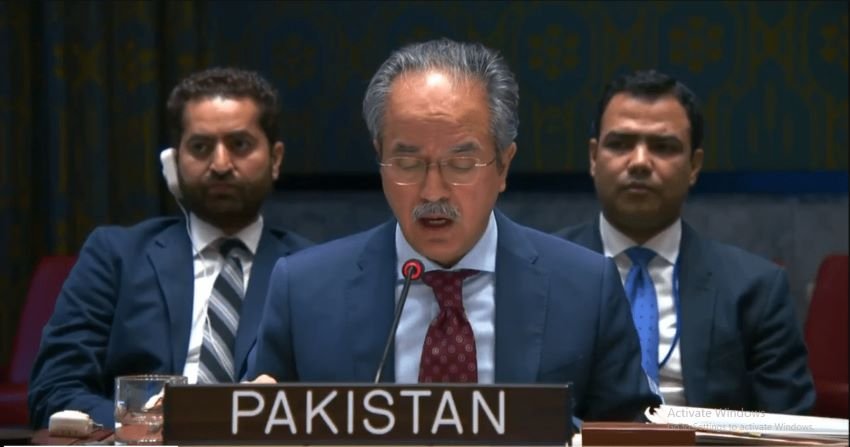United Nations (TDI): Pakistan has urged the United Nations Security Council (UNSC) to ensure that fundamental principles of the UN Charter, including self-determination, sovereign equality, non-interference, and peaceful settlement of disputes, are upheld without political bias or selectivity.
Addressing a special UNSC session marking 80 years of the UN’s founding, Pakistan’s Permanent Representative to the United Nations, Ambassador Asim Iftikhar Ahmad, said selective implementation of these principles was most visible in the denial of justice to the peoples of Palestine and Kashmir.
He noted that the Jammu and Kashmir dispute, one of the oldest unresolved issues on the Council’s agenda, still awaits implementation of Security Council resolutions guaranteeing the right of self-determination through a UN-supervised plebiscite.
“The people of Kashmir continue to look to the international community, and particularly this Council, to deliver on promises made to them decades ago,” the ambassador emphasized, adding that continued disregard of these commitments undermines trust in the multilateral system.
His remarks prompted a response from India’s representative, Parvathaneni Harish, who repeated India’s claim that Jammu and Kashmir is an integral part of India. Responding sharply, Pakistani delegate Gul Qaiser Sarwani rejected the assertion, stating that Kashmir remains an internationally recognized disputed territory.
Read More: Pakistan Unveils Debt Overhaul Strategy Amid Record Rs 76 Trillion
In his broader address, Ambassador Asim Ahmad reflected on the UN’s eight-decade journey, noting its vital contributions to peace, human rights, and development. However, he cautioned that the world today faces rising inequalities, weakening adherence to international law, and growing mistrust among major powers, all while confronting new threats such as climate change, pandemics, cyber insecurity, and the disruptive potential of artificial intelligence.
“Multilateralism is under stress precisely when cooperation is most needed,” he said. “The best measure of our commitment is to strengthen the United Nations, the most representative platform for addressing global challenges.”
The ambassador also drew attention to the suffering of Palestinians, calling for a renewed push toward a Two-State Solution based on pre-1967 borders, with Al-Quds Al-Sharif as the capital of a sovereign, contiguous Palestinian state.
Emphasizing the need for reform, he outlined several key proposals: expanding elected representation in the Security Council while opposing new permanent memberships, empowering the General Assembly to play a more decisive role in global policymaking, restructuring the global financial system on fair and inclusive foundations, and ensuring responsible regulation of emerging technologies such as AI for peaceful and ethical use.
“The world order envisioned in the UN Charter must be reinforced through a stronger, more representative system that delivers justice, peace, and equitable development,” he concluded.



